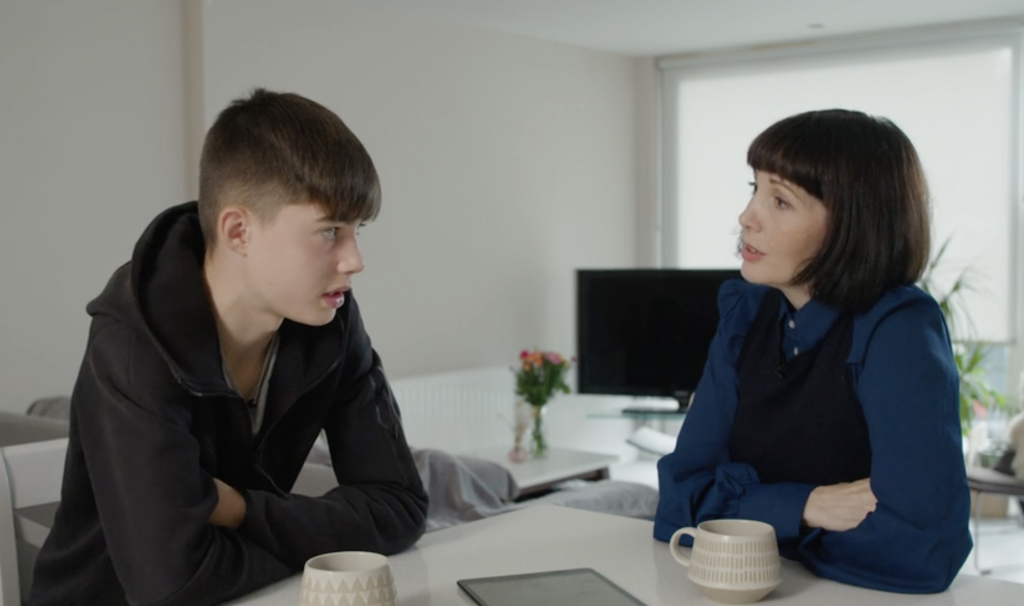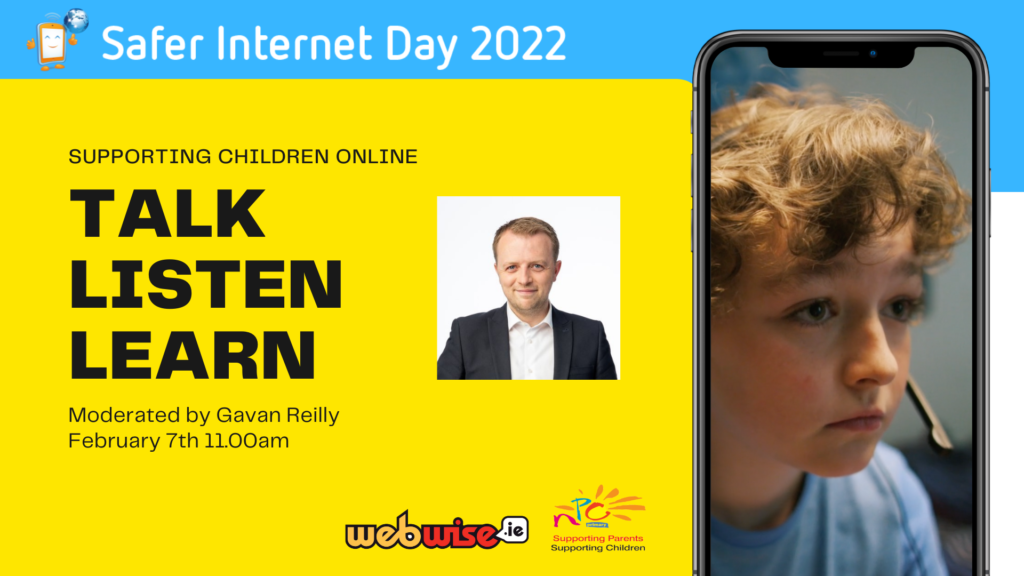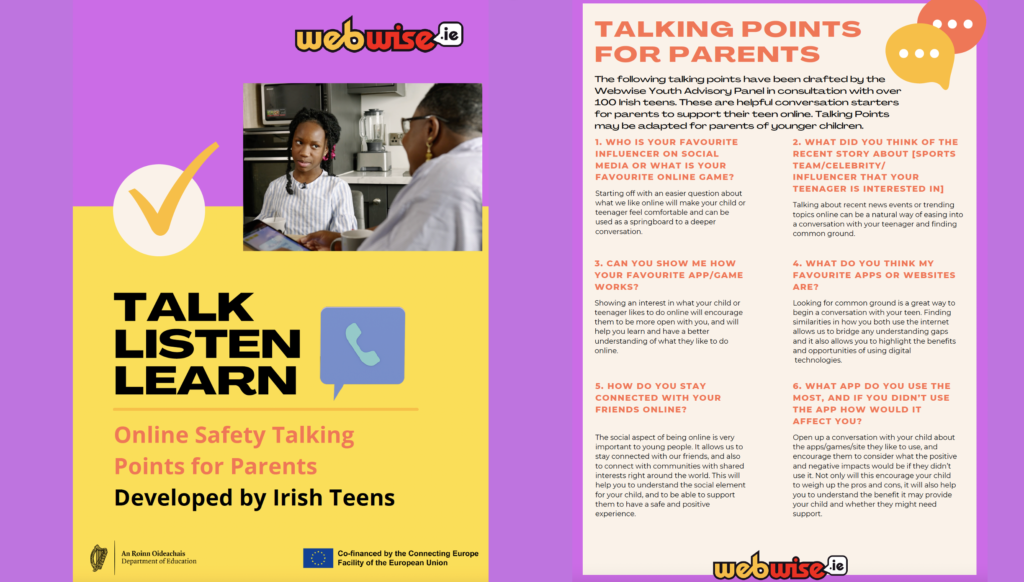64% of parents are unaware if children have been bothered or upset by something that has happened to their child online.
 To mark this year’s Safer Internet Day with the theme of #TalkListenLearn, a new survey conducted as a collaboration with the National Parents Council Primary, Webwise (the Irish Internet Safety Awareness Centre) and TU Dublin explores parental attitudes to online risks and safety and effective parenting strategies to supporting children online. The survey, that over 1000 parents completed, found that although 72% of children discuss with their parents what they do online, only 34% of them ask for advice about how to act online, and just 1 in 3 children looked for help with a difficult situation online.
To mark this year’s Safer Internet Day with the theme of #TalkListenLearn, a new survey conducted as a collaboration with the National Parents Council Primary, Webwise (the Irish Internet Safety Awareness Centre) and TU Dublin explores parental attitudes to online risks and safety and effective parenting strategies to supporting children online. The survey, that over 1000 parents completed, found that although 72% of children discuss with their parents what they do online, only 34% of them ask for advice about how to act online, and just 1 in 3 children looked for help with a difficult situation online.
The survey also found:
· 64% of Parents are unaware if children have been bothered or upset by something that has happened to their child online.
· 59% of parents are unaware how often their child has been upset by something online.
· Only 26% of parents think their child can cope with things online that bother or upset them.
In order to help their children to get the most out of going online, parents need dedicated support and guidance in relation to digital parenting. More than half of parents surveyed want more online (64%) and face-face (45%) training to support their child online.
The survey comes ahead of Safer Internet Day 2022, an annual day to raise awareness and promote safer, better internet use among children, coordinated by Webwise. Events taking place for Safer Internet Day 2022 include:
· Over 170,000 Irish students and 600 schools and organisations will participate in lessons, activities and online safety initiatives for Safer Internet Day
· Webwise the internet safety initiative of the Professional Development Service for Teachers (PDST) launch new tools and resources for parents including a Topic Generator, Parents Guide and Talking Points developed by Irish Teens.
· More than 1200 parents have signed up for online safety workshops organised by National Parents Council Primary.
 Online safety experts will gather for Safer Internet Day to highlight key findings in relation to supporting children online. Drawing upon key findings from the recent Parents’ Survey and the Online Safety Survey of Children and Parents by the National Advisory Council for Online Safety (NACOS), experts including Professor Brian O’Neill and Child Psychologist Colman Noctor will explore ways to support families online at an event hosted by the National Parents Council Primary and Webwise. A key area of discussion will be in relation to a key finding from the NACOS report that many children don’t tell if something bothers them online; approximately half of teens (52% of boys and 49% of girls) did not tell either of their parents the last time something happened online that bothered or upset them and one third of boys aged 9-12 did not tell.
Online safety experts will gather for Safer Internet Day to highlight key findings in relation to supporting children online. Drawing upon key findings from the recent Parents’ Survey and the Online Safety Survey of Children and Parents by the National Advisory Council for Online Safety (NACOS), experts including Professor Brian O’Neill and Child Psychologist Colman Noctor will explore ways to support families online at an event hosted by the National Parents Council Primary and Webwise. A key area of discussion will be in relation to a key finding from the NACOS report that many children don’t tell if something bothers them online; approximately half of teens (52% of boys and 49% of girls) did not tell either of their parents the last time something happened online that bothered or upset them and one third of boys aged 9-12 did not tell.
Comparing parent and child data shows that parents underestimate negative experiences reported by children.
· Less than half of parents are aware of contact and conduct risks their children have experienced
· Where children have been exposed to harmful online content, just one third of parents are aware of this
· Where 28% of children report having had online contact with people they had not previously known, just 11% of parents are aware of this.
#TalkListenLearn – Supporting Families
Increasing active parental mediation in children and young people’s digital lives is important for developing greater awareness about issues that may arise online and building resilience in the face of those challenges.
Children are broadly happy (70%) with the level of parental involvement but just under 10% would like their parents to be more involved. This does not mean more restrictions, however, in fact active mediation is according to the literature likely to be much more effective – and importantly is respectful of children’s rights to privacy and growing independence.
Professor Brian O’Neill
Exploring why children don’t tell when they come across harmful or upsetting content whilst online is at the centre of keeping children safe. The relationship between a parent and their child is critical to keeping children safe, however we need to urgently continue to research this particular issue so that we can best support children when they are feeling most vulnerable.
Áine Lynch
CEO National Parents Council
Getting families talking
Deputy Director of PDST Digital Technologies, Anthony Kilcoyne said: “For Safer Internet Day, we’re encouraging families to #TalkListenLearn. Webwise have excellent resources and supports available to parents. In addition to the Webwise Parents Hub, families can use the #TalkListenLearn topic generator to begin open conversations free from judgement or criticism; this is a great starting point.”
Students from across Ireland gathered together to develop a resource to help parents talk to their children. In consultation with Webwise, over 140 students collaborated to develop a set of Talking Points to give parents more confidence to effectively discuss a range of online safety topics with their child. The Talking Points and updated Parents Guide to a Better Internet can be accessed via webwise.ie.
For further information, check out webwise.ie or Webwise.ie/parents
Join the conversation at: facebook.com/Webwise, @Webwise_Ireland on Twitter or #WebwiseParents
-Ends-
For further details, please contact:
Áine Lynch – National Parents Council Primary
Tel: (01) 887 4034 / Mob: 087 929 4949






